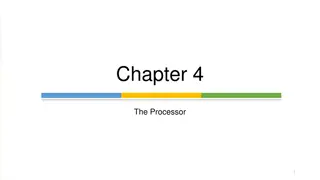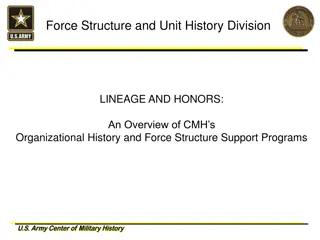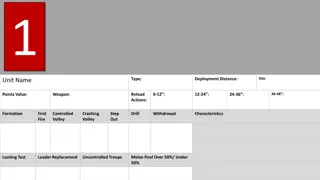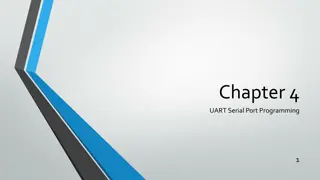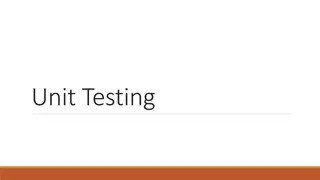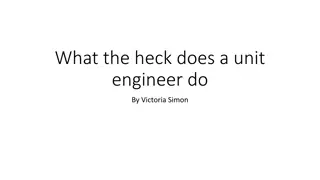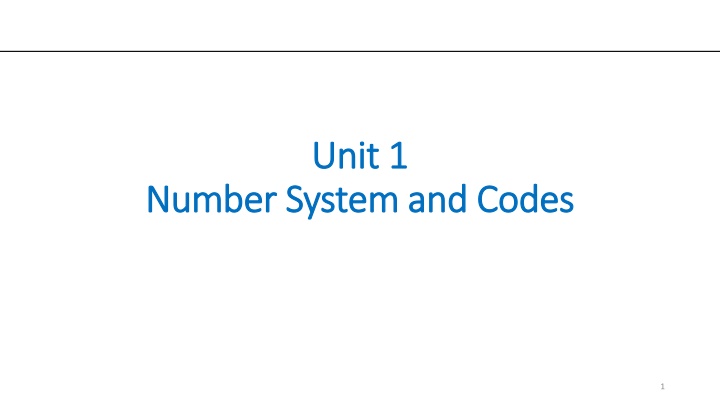
Exploring Number Systems and Binary Operations
Discover the four basic types of number systems - Binary, Octal, Decimal, and Hexadecimal. Learn about their characteristics, base numbers, and examples. Explore binary arithmetic operations like addition, subtraction, multiplication, and division, including rules and examples. Dive into the world of binary addition with step-by-step instructions and practice exercises.
Download Presentation

Please find below an Image/Link to download the presentation.
The content on the website is provided AS IS for your information and personal use only. It may not be sold, licensed, or shared on other websites without obtaining consent from the author. If you encounter any issues during the download, it is possible that the publisher has removed the file from their server.
You are allowed to download the files provided on this website for personal or commercial use, subject to the condition that they are used lawfully. All files are the property of their respective owners.
The content on the website is provided AS IS for your information and personal use only. It may not be sold, licensed, or shared on other websites without obtaining consent from the author.
E N D
Presentation Transcript
Unit 1 Unit 1 Number System and Codes Number System and Codes 1
Basic types of number system There are four basic types of number system Binary Number System Octal Number System Decimal Number System Hexadecimal number system 2
Binary Number System It has two number 0,1 Base is 2 e.g. (01010)2 3
Octal Number System It has eight numbers 0, 1, 2, 3, 4, 5, 6, 7 Base is 8 e.g. (124501)8 4
Decimal Number System It has ten numbers 0, 1, 2, 3, 4, 5, 6, 7, 8, 9 Base is 10 e.g. (101954)10 5
Hexadecimal Number System It has Sixteen numbers 0, 1, 2, 3, 4, 5, 6, 7, 8, 9, 10=A, 11=B, 12=C, 13=D, 14=E, 15=F Base is 16 e.g. (124FAF)16 6
Binary Octal B2 0 B1 0 B0 0 0 0 0 1 1 0 1 0 2 0 1 1 3 1 0 0 4 1 0 1 5 1 1 0 6 1 1 1 7 7
Binary Hexadecimal B3 B2 B1 B0 0 0 0 0 0 0 0 0 1 1 0 0 1 0 2 0 0 1 1 3 0 1 0 0 4 0 1 0 1 5 0 1 1 0 6 0 1 1 1 7 1 0 0 0 8 1 0 0 1 9 1 0 1 0 A 1 0 1 1 B 1 1 0 0 C 1 1 0 1 D 1 1 1 0 E 1 1 1 1 F 8
Binary Arithmetic Addition Subtraction Multiplication Division 9
Binary Addition Rule for Addition A B Sum Carry 0 0 0 0 0 1 1 0 1 0 1 0 1 1 0 1 10
Binary Addition 1. Add 1011 and 1100 2. Add 0101 and 1111 1 1 1 1 1 0 1 0 1 1 0 1 1 + + 1 1 1 1 1 1 0 0 1 0 1 0 0 1 0 1 1 1 Carry Carry 11
Binary Addition 3. Add 101.11 and 110.1 1 1 1 1 1 0 1 . 1 1 + 1 1 0 . 1 1 1 0 0 . 0 1 Carry 12
Binary Addition 4. Add the following numbers 1 1 1 1 1 0 1 1 + 0 1 0 0 + 0 0 1 1 0 1 0 0 1 0 1 1 0 Carry 13
Binary Addition H.W. 1. Add 1100 and 0001 2. Add 1100 and 1110 3. Add 101011 and 110011 4. Add 1100 and 1000 5. Add 1111 and 1010 6. Add 1010.1100 and 110.1010 7. Add 10101.1001 and 1010.101011 14
Binary Subtraction Rule for Subtraction A B Difference Borrow 0 0 0 0 0 1 1 1 1 0 1 0 1 1 0 0 15
Binary Subtraction 1. Subtract 1011 and 0110 2. Subtract 0101 and 1111 1 1 1 0 1 0 1 1 0 1 1 + - 1 1 1 1 0 1 1 0 1 1 1 1 0 0 1 0 1 Borrow 16
Binary Subtraction H.W. 1. Subtract 1100111 and 0001 2. Subtract 1100 and 0101001 3. Subtract 101011 and 110011 4. Subtract 11010011 and 10011101 17
Binary Multiplication Rule for Multiplication A B Multiplication 0 0 0 0 1 0 1 0 0 1 1 1 18
Binary Multiplication 1. Multiply 1001 and 1101 1 0 0 1 * 1 1 0 1 0 1 0 1 + 0 0 0 0 + 0 1 0 1 1 0 0 1 1 1 1 0 1 0 1 19
Binary Multiplication H.W. 1. Multiply 1000 and 1010 2. Multiply 1000 and 1010 3. Multiply 100 and 101 4. Multiply 111 and 001 20
Binary Division 1. Divide 1110101 by 1001 1 0 1 1 1 0 0 1 1 1 1 0 1 1 0 - 1 0 0 1 1 0 1 0 1 - 1 0 0 1 0 0 1 0 0 - 0 0 0 0 0 1 0 0 1 0 - 1 0 0 1 0 0 0 0 21
Binary Division H.W. 1. Divide 11101101 by 1001 2. Divide 11011011 by 110 3. Divide 11001 by 101 4. Divide 1111101 by 101 22
Conversion of one number System into Other 1. Binary to Decimal Number System 2. Binary to Octal Number System 3. Binary to Hexadecimal Number System 4. Octal to Decimal Number System 5. Octal to Binary Number System 6. Octal to Hexadecimal Number System 7. Decimal to Binary Number System 8. Decimal to Octal Number System 9. Decimal to Hexadecimal Number System 10. Hexadecimal to Binary Number System 11. Hexadecimal to Octal Number System 12. Hexadecimal to Decimal Number System 23
1. Binary to Decimal Number System 1. Find the decimal equivalent of the binary number (11111)2 Solution: = 1 24 + 1 23 + 1 22 + 1 21 + 1 20 = 16 + 8 + 4 + 2 + 1 = 31 (11111)2 =(31)10 24
1. Binary to Decimal Number System 2. Find the decimal equivalent of (101101)2 Solution: = 1 25 + 0 24 + 1 23 + 1 22 + 0 21 + 1 20 = 32 + 0 + 8 + 4 + 0 + 1 = 45 (101101)2 =(45)10 25
1. Binary to Decimal Number System 2. Find the decimal equivalent of (101101.10101)2 Solution: = 1 25 + 0 24 + 1 23 + 1 22 + 0 21 + 1 20 + 1 2-1 + 0 2-2 + 1 2-3 + 0 2-4 + 1 2-5 = 32 + 0 + 8 + 4 + 0 + 1 + 1 + 0 + 1 + 0 + 1 23 21 25 22 24 = 45 + 0.5 + 0 + 0.125 + 0 + 0.03125 = 45.65625 (101101)2 =(45.65625)10 26
Binary to Decimal Number System H.W. 1. Convert (110101)2 to equivalent decimal number 2. Convert (1111111111)2 to equivalent decimal number 3. (1010101.1011)2 = (---------------)10 4. (0.10100101)2 = (---------------)10 5. Convert binary number 10101.1100 to equivalent decimal number 6. Convert binary number 01001101010 to equivalent decimal number 27
Binary Octal B2 0 B1 0 B0 0 0 0 0 1 1 0 1 0 2 0 1 1 3 1 0 0 4 1 0 1 5 1 1 0 6 1 1 1 7 28
2. Binary to Octal Number System 1. Convert (1001110)2 to it s equivalent octal number To convert Binary number to Octal number Make the group of three 1 0 0 1 1 1 0 Add two zeros to Left hand side 0 0 1 0 0 1 1 1 0 1 1 6 (1001110)2 =(116) 8 29
2. Binary to Octal Number System 1. Convert (1110001.101001)2to it s equivalent octal number 1 1 1 0 0 0 1 . 1 0 1 0 0 1 Add two zeros to Left hand side 0 0 1 1 1 0 0 0 1 . 1 0 1 0 0 1 5 1 1 1 6 (1110001.101001)2 =(161.51) 8 30
Binary to Octal Number System H.W. 1. Convert (1101011010100.1011010)2 to equivalent Octal number 2. Convert (1110101.001011111)2 to equivalent Octal number 3. (1010110101.110101011)2 = (---------------)8 4. (001010010101000101)2 = (---------------)8 5. Convert binary number 101010101.110010100 to equivalent Octal number 6. Convert binary number 10101010110010100 to equivalent Octal number 31
Binary Hexadecimal B3 B2 B1 B0 0 0 0 0 0 0 0 0 1 1 0 0 1 0 2 0 0 1 1 3 0 1 0 0 4 0 1 0 1 5 0 1 1 0 6 0 1 1 1 7 1 0 0 0 8 1 0 0 1 9 1 0 1 0 A 1 0 1 1 B 1 1 0 0 C 1 1 0 1 D 1 1 1 0 E 1 1 1 1 F 32
3. Binary to Hexadecimal Number System 1. Convert (1001111110.010101)2 to it s equivalent Hexadecimal number To convert Binary number to Hexadecimal number Make the group of Four 1 0 0 1 1 1 1 1 1 0 . 0 1 0 1 0 1 Here to complete group of four we have to add two zeros to the left and two zeros to the right 0 0 1 0 0 1 1 1 1 1 1 0 . 0 1 0 1 0 1 0 0 7 2 5 4 E (1001111110.010101)2 =(27E.54) 16 33
Binary to Hexadecimal Number System H.W. 1. Convert (1101011010100.1011010)2 to equivalent Hexadecimal number 2. Convert (11101101001001.001011111)2 to equivalent Hexadecimal number 3. (10101.1100101101011)2 = (---------------)16 4. (0010100101010010100101)2 = (---------------)16 5. Convert binary number 101010101.110010100 to equivalent Hexadecimal number 6. Convert binary number 10101010110010100 to equivalent Hexadecimal number 34
4. Octal to Decimal Number System 1. Find the decimal equivalent of the Octal number (22416)8 Solution: = 2 84 + 2 83 + 4 82 + 1 81 + 6 80 = 8192 + 1024 + 256 + 8 + 6 = 9486 (22416)8 =(9486)10 35
4. Octal to Decimal Number System 2. Find the decimal equivalent of (6327.4051)8 Solution: = 6 83 + 3 82 + 2 81 + 7 80 + 4 8-1 + 0 8-2 + 5 8-3 + 1 8-4 = 3072 + 192 + 16 + 7 + 4 + 0 + 5 + 1 83 82 84 81 = 3072 + 192 + 16 + 7 + 0.5 + 0 + 0.00976 + 0.000244 = 3287.5100098 (6327.4051)2 =(3287.5100098)10 36
Octal to Decimal Number System H.W. 1. Convert (3212.5612)8 to equivalent decimal number 2. Convert (1245.36245)8 to equivalent decimal number 3. (543621)8 = (---------------)10 4. (366.54)8 = (---------------)10 5. Convert octal number 3256.12 to equivalent decimal number 6. Convert octal number 23145.3256 to equivalent decimal number 37
12. Hexadecimal to Decimal Number System 1. Find the decimal equivalent of the hexadecimal number (6AC)16 Solution: = 6 162 + 10 161 + 12 160 = 1536 + 160 + 12 = 1708 (6AC)16 =(1708)10 38
12. Hexadecimal to Decimal Number System 2. Find the decimal equivalent of (9A.2F2)16 Solution: = 9 161 + 10 160 + 2 16-1 + 15 16-2 + 2 16-3 = 144 + 10 + 2 + 15 + 2 162 161 163 = 154 + 0.125 + 0.0039 + 0.000488 = 154.129388 (9A.2F2)16 =(154.129388)10 39
Hexadecimal to Decimal Number System H.W. 1. Convert (498.25)16 to equivalent decimal number 2. Convert (1B5.36A)16 to equivalent decimal number 3. (12CA)16 = (---------------)10 4. (36.54)16 = (---------------)10 5. Convert hexadecimal number 3A6.A2 to equivalent decimal number 40
Binary Octal B2 0 B1 0 B0 0 0 0 0 1 1 0 1 0 2 0 1 1 3 1 0 0 4 1 0 1 5 1 1 0 6 1 1 1 7 41
5. Octal to Binary Number System 1. Find the binary equivalent of the octal number (736)8 Solution: ( 736 )8 = ( 1 1 1 0 1 1 1 1 0 ) 2 2. Find the binary equivalent of the octal number 10.74 ( 10.74)16 = ( 0 0 1 0 0 0 . 1 1 1 1 0 0 ) 2 42
Octal to Binary Number System H.W. 1. Convert (364.25)8 to equivalent binary number 2. Convert (1245.36245)8 to equivalent Binary number 3. (543621)8 = (---------------)2 4. (366.54)8 = (---------------)2 5. Convert octal number 3256.1232 to equivalent binary number 6. Convert octal number 245.36 to equivalent binary number 43
10. Hexadecimal to Binary Number System 1. Find the binary equivalent of the hexadecimal number (2F9)16 Solution: ( 2F9 )16 = ( 0 0 1 0 1 1 1 1 1 0 0 1 ) 2 2. Find the binary equivalent of the hexadecimal number (2A.21)16 ( 2A.21 )16 = ( 0 0 1 0 1 0 1 0 . 0 0 1 0 0 0 0 1 ) 2 44
Binary Hexadecimal B3 B2 B1 B0 0 0 0 0 0 0 0 0 1 1 0 0 1 0 2 0 0 1 1 3 0 1 0 0 4 0 1 0 1 5 0 1 1 0 6 0 1 1 1 7 1 0 0 0 8 1 0 0 1 9 1 0 1 0 A 1 0 1 1 B 1 1 0 0 C 1 1 0 1 D 1 1 1 0 E 1 1 1 1 F 45
10. Hexadecimal to Binary Number System H.W. 1. Convert (AFB2)16 to equivalent binary number 2. Convert (20AB)16 to equivalent binary number 3. (200E)16 = (---------------)2 4. (AB8C)16 = (---------------)2 5. Convert hexadecimal number 74.AC into equivalent binary number. 6. Convert hexadecimal number 259.A2 into equivalent binary number. 46
11. Hexadecimal to Octal Number System 1. Find the octal equivalent of the hexadecimal number (2F9)16 Solution: ( 2F9 )16 = ( 0 0 1 0 1 1 1 1 1 0 0 1 ) 2 = 0 0 1 0 1 1 1 1 1 0 0 1 1 = 1 3 7 ( 2F9 )16 = ( 1371) 8 47
11. Hexadecimal to Octal Number System 1. Find the octal equivalent of the hexadecimal number (68.4B)16 Solution: (68.4B )16 = ( 0 1 1 0 1 0 0 0 . 0 1 0 0 1 0 1 1 ) 2 = 0 0 1 1 0 1 0 0 0 . 0 1 0 0 1 0 1 1 0 . 6 = 2 2 1 0 5 ( 2F9 )16 = ( 150.226) 8 48
11. Hexadecimal to Octal Number System H.W. 1. Convert (A72E)16 to equivalent octal number 2. Convert (0.12E)16 to equivalent octal number 3. (0.BF85)16 = (---------------)8 49
7. Decimal to Binary Number System 1. Find the binary equivalent of the decimal number (13)10 Solution: Q R = 13/2 6 1 6/2 3/2 3 0 1 1 1/2 0 1 (13)10 =(1101)2 50





